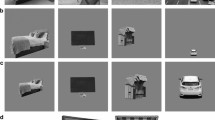Abstract
A strong claim, often found in the literature, is that it is impossible to categorize perceptual properties unless one possesses the related concepts. The evidence from visual perception reviewed in this paper however questions this claim: Concepts, at least canonically defined, are ill-suited to explain perceptual categorisation, which is a fast, and crucially a largely involuntary and unconscious process, which rests on quickly updated probabilistic calculations. I suggest here that perceptual categorisation rests on non-conceptual sorting principles. This changes the claim that categorisation cannot occur without concepts: It does not preclude that the concepts remain necessary for categorisation, but opens the possibility that they are not and that those sorting principles could be here sufficient.


Similar content being viewed by others
Notes
See Machery 2009 for discussion.
Thought is here considered mostly as rational thought or reasoning, but the use of concepts might also other kinds of thinking processes, like conscious mind wandering and associative thinking.
See Moors and De Houwer ( 2006 ) .
Separating perceptual from verbal categorisation is non-trivial. This is discussed below, but see Davidoff ( 2001 ) for a more comprehensive review.
See Davidoff ( 2001 ) for a much more detailed discussion.
The question of timing also bears on the interpretation of the effect as a top-down effect, but this matter is orthogonal to the present concern (see Firestone and Scholl 2015 for a review).
As pointed by a reviewer, one needs to underscore the difficulty to control for stimuli and be reminded that the effects are usually observed at the green-blue boundary but not with other color sets.
Durgin ( 2000 ) .
As pointed by a reviewer, the lack of control comes from perceivers being unable to refrain from using these principles, not from perceivers not being able to voluntarily apply them.
References
Ashby, F.G., J.M. Ennis, and B.J. Spiering. 2007. A neurobiological theory of automaticity in perceptual categorisation. Psychological Review 114 (3): 632–656.
Bird, C.M., S.C. Berens, A.J. Horner, and A. Franklin. 2014. Categorical encoding of colour in the brain. Proceedings of the National Academy of Sciences 111 (12): 4590–4595.
Brouwer, G.J., and D.J. Heeger. 2013. Categorical clustering of the neural representation of colour. Journal of Neuroscience 33 (39): 15454–15465.
Davidoff, J. 2001. Language and perceptual categorisation. Trends in Cognitive Sciences 5 (9): 382–387.
Durgin, D.H. 2000. The reverse Stroop effect. Psychonomic Bulletin & Review 7 (1): 121–125.
Earl, F. (2017) Concepts. Internet Encyclopedia of Philosophy.
Firestone, C., and B.J. Scholl. 2015. Can you experience ‘top-down effects on perception?: The case of race categories and perceived lightness. Psychonomic Bulletin & Review 22 (3): 694–700.
Fonteneau, E., and J. Davidoff. 2007. Neural correlates of colour category processing. Journal of Vision 7 (9): 461–461.
Forder, L., X. He, and A. Franklin. 2017. Colour categories are reflected in sensory stages of colour perception when stimulus issues are resolved. PLoS One 12 (5): e0178097.
Gärdenfors, P. (2000). The geometry of thought. Boston: MIT Press.
Greene, M.R., and L. Fei-Fei. 2014. Visual categorization is automatic and obligatory: Evidence from the Stroop-like paradigm. Journal of Vision 14 (1): 14–14.
Harnad, S. (2003). Categorical perception. In Encyclopedia of cognitive science (Vol. 67, No. 4). MacMillan: Nature Publishing Group.
Jraissati, Y. 2012. Categorical perception of color: Assessing the role of language. Croatian Journal of Philosophy 12 (3): 439–462.
Levin, D.T., and M.R. Banaji. 2006. Distortions in the perceived lightness of faces: The role of race categories. Journal of Experimental Psychology: General 135 (4): 501–512.
Machery, E. 2009. Doing without concepts. Oxford: Oxford University Press.
Mandelbaum, E. 2017. Seeing and conceptualizing: Modularity and the shallow contents of perception. Philosophy and Phenomenological Research 97: 267–283. https://doi.org/10.1111/phpr.12368.
Moors, A. 2016. Automaticity: Componential, causal, and mechanistic explanations. Annual Review of Psychology 67: 263–287.
Moors, A., and J. De Houwer. 2006. Automaticity: A theoretical and conceptual analysis. Psychological Bulletin 132 (2): 297–326.
Payne, B.K. 2001. Prejudice and perception: The role of automatic and controlled processes in misperceiving a weapon. Journal of Personality and Social Psychology 81: 181–192.
Travers, E., M.T. Fairhurst, and O. Deroy. 2017. Racial biases in social perception: Fast, unconscious, but still surmountable. PsyArXiv 28. https://doi.org/10.31234/osf.io/je7j4
White, T.P., R.L. Wigton, D.W. Joyce, T. Bobin, C. Ferragamo, N. Wasim, S. Lisk, and S.S. Shergill. 2014. Eluding the illusion? Schizophrenia, dopamine and the McGurk effect. Frontiers in Human Neuroscience 8.
Winawer, J., N. Witthoft, M.C. Frank, L. Wu, A.R. Wade, and L. Boroditsky. 2007. Russian blues reveal effects of language on colour discrimination. Proceedings of the National Academy of Sciences 104 (19): 7780–7785.
Author information
Authors and Affiliations
Corresponding author
Additional information
Publisher’s Note
Springer Nature remains neutral with regard to jurisdictional claims in published maps and institutional affiliations.
Rights and permissions
About this article
Cite this article
Deroy, O. Categorising without Concepts. Rev.Phil.Psych. 10, 465–478 (2019). https://doi.org/10.1007/s13164-019-00431-2
Published:
Issue Date:
DOI: https://doi.org/10.1007/s13164-019-00431-2




